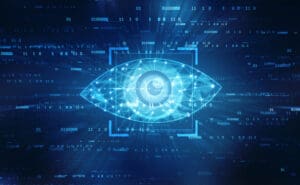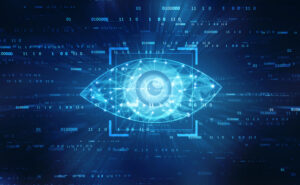
Artificial intelligence is already omnipresent in our private everyday life, through the likes of voice-controlled household helpers, self-driving cars, and optimized adverts that stem from the behavioural analysis of our smartphone and internet history.
And while many workplaces are already using AI for their evaluations and work, it will not be long before those workplaces themselves are protected and optimized by AI. Discover how AI is already used in the workplace and how it could help you, and where it could be installed in the future.
Making the workplace more secure
Occupational safety is rightly one of the most important issues when it comes to wellbeing at work, in terms of both the physical and psychological integrity of the employees. And while wearing personal safety equipment goes a long way to providing essential protection, the use of artificial intelligence allows us to take space surveillance and accident prevention to a whole new level. This is especially true when employed in work environments with critical conditions such as temperature fluctuations, released chemicals, or the handling of hazardous machinery. Continuously checking single-board computers and chips that are fed with data and information, for example, can monitor the air quality or the prevailing volume to foresee possible devastating decisions or track the movements of workers, and thus avoid accidents and chronic injuries.
Automation of repetitive tasks
The idea of artificial intelligence is not that it should replace us, but instead maximize our overall productivity in order to free up space for innovation – to allow us more time and space for creativity and the development of ideas. A major concern of AI is therefore to take over repetitive admin tasks such as data analysis and evaluations. This also extends to project management, not in the sense of replacing the people involved, but to aid the analysis of workflow and seek opportunities for improvement. The more AI can take over the repetitive tasks involved with these types of role and ensure efficient and error-free results, the more focus can be placed on the actual product or offering of the business and its further development.
Opening up the horizons
Machines and their AI also have the advantage that they can be used in conditions that would be either unattainable or unacceptable for humans to work in, be it the deep sea, in space, or in environments where there is the presence of radioactivity or highly toxic chemicals. While that is not relevant to every business, this opens new doors for others and provides a knock-on competitive edge.
AI and its hardware are getting cheaper, smarter, and more accessible with each passing year. Before long, they will ensure that some of the jobs we know today will simply die out and be replaced by machines and robots. However, they will also help to make our ongoing workplaces safer and more convenient – and those who make the switch and invest now can reap great benefits for themselves and their employees in the long run.
Read more:
How AI will change our workplace

